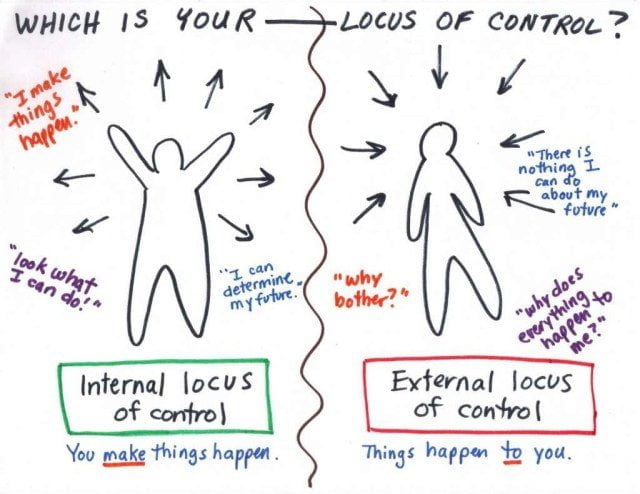Locus of Control
Rotter suggests an internal locus of control relates to “the degree to which people expect an outcome of their behaviour is contingent on their own behaviour or personal characteristics”.
People look at things differently. Some people believe things happen to them, while others believe they can influence what happens to them. Technically this is called the ‘locus of control’. People can have an Internal or external Locus of Control
Internal
- More likely to take responsibility for actions
- Tend to be less influenced by others
External
- Blame outside forces for what happens
- Don’t believe they can change their situation themselves
People tend to take more responsibility (locus gets more internal) as they get older. However, external isn’t always bad – for example if you are physically unable to do some things you can accept it and focus on the things you can do. This American video explains the concept and gives examples of how this can affect relationships.

Overview
The ‘Locus of Control’ is a continuous scale which, at one end, has those who attribute success and failure to things they have control over (‘internal’), and, at the other end of the scale, those who consider their success or failure is due to forces outside of their influence (‘external’).
Julian Rotter, an American psychologist, developed the Locus of Control scale. He was influenced by Alfred Adler (personality theory), Clark Hull (drive theory / laws of behaviour), Burhuss Skinner (operant conditioning) and Edward Tolman (purposive behaviourism). Although prominent theories of his time included psychoanalysis (Breuer, Freud) and behaviourism (Pavlov, Thorndike, Watson, Skinner) he moved towards social learning theory, whereby new behaviours can be gained by observing and imitating others and the individual’s interaction with their environment.
Rotter developed the Locus of Control scale as a measure of two concepts: achievement motivation (internal LoC) and out-directedness (external LoC).
You can take a test to see what your locus of control is. You can either download a PDF of the test and take it yourself, or take it online on our site (see below).

Time's up
External
“External” Pros
There can be times when having an external Locus of Control can be an advantage, particularly in situations where people need to be considerate and more easy-going
“External” Cons
Are generally more stressed
Blame others for their life outcomes
Consider their own actions are as a result of external factors e.g. fate, luck, chance, higher power, influence of powerful others or simply unpredictable
Display low achievement motivation and high outer-directedness
Feel that things happen outside of their control
Feel they have less control over own fate
Outcomes of events are attributed to external circumstances
Balanced-Internal
“Balanced-internal” Pros
Less anxious, less prone to depression and suicide
Less debilitating anxiety and less test anxiety
Less likely to feel like a victim of circumstance
More likely to actively try to improve their situation
More likely to observe factors they can use to create positive outcomes in the future
“Balanced-internal” Cons
Sometimes events are random and out of someone’s control
More likely to come across as arrogant to others
Likely to be unstable or neurotic if the internal locus doesn’t realistically reflect their competence
Internal
“Internal” Cons
An overly-strong internal Locus of Control may result in an individual being unaware of the feelings of others and can appear arrogant or over-confident
Highly internal people can accept blame or responsibility for events or outcomes beyond their actual realm of control
Locus of Control (LoC) – Influences and Implications
Clients: Internal clients will engage in therapy as a collaborative process; will engage in homework tasks and activities. External clients will blame others e.g. smoking cessation relapse = ‘It failed’ rather than internal accepting responsibility ‘I lapsed’; will expect therapy to be done ‘to them’; will expect the therapist to do their job, and are less likely to engage in homework tasks and activities.
Self-efficacy: Self-efficacy is the person’s belief that they can accomplish a particular task or activity. Higher external LoC + lower self-efficacy = higher illness-related psychological distress and more responsive to stress.
Healthcare: Health LoC relates to the extent to which individuals attribute their health to their own actions or to environmental circumstances and powerful external agent. An internal locus of control suggests that positive health results from one’s own doing, willpower or sustained efforts. An external locus of control is marked by belief in the influence of fate, powerful others, or supernatural occurrences upon one’s health e.g. An external LoC won’t screen for cancer when there is a family history of cancer as will think along the lines of; “Why screen for cancer, if I am destined to die anyway?”
Work: Internals earn more money for the same amount of time they work and earn more across a wide variety of employment situations, and are more desirable employees. Whereas an external does not seek to improve their self, or their skills set.
Gambling: For an internal, their gambling is more reserved, focused on safe and moderate wagers. Externals take more chances e.g. bet more on a card that hasn’t appeared recently, as consider it more likely to appear.
Children: Children in supportive families with consistent discipline, tend to develop internal LoC; children who learn the connection between action and consequences have a more internal LoC; men and women with a more internal LoC in childhood (measured at age 10) had healthier behaviours, including reduced risk of obesity, overweight, poor-self-rated health or psychological distress at age 30; having a stronger sense of control over one’s own life in childhood seems to be a protective factor for some aspects of health in adult life; internal children tend to do better in school; children whose parents are external LoC tend to be more external (Rotter, social learning theory)









